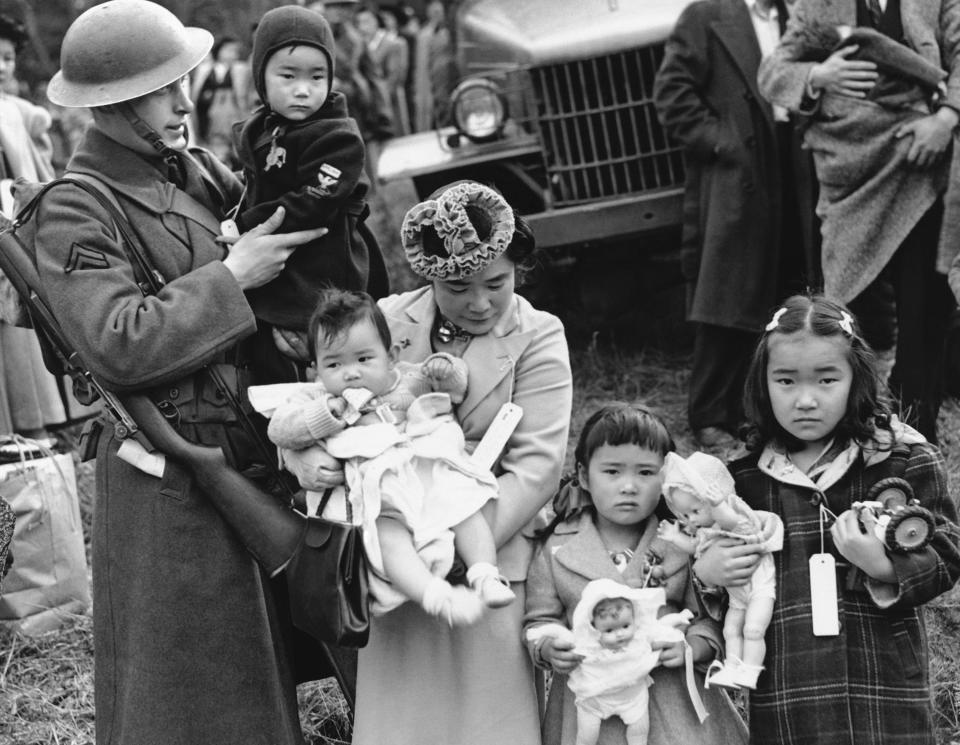FDR's granddaughter on immigration: Our country did not learn

The country hasn’t learned from history, says Anna Eleanor Roosevelt, President Franklin Delano Roosevelt’s granddaughter, who calls current immigration policies, like the internment of Japanese-Americans after Pearl Harbor, “inconsistent with who we are as a country.”
Roosevelt, 70, wasn’t yet born when her grandfather issued the executive order that forced 120,000 Japanese-Americans, including citizens, into internment camps. But she said history provided a “very available lesson to learn from, and we didn’t. Our country did not learn.”
President Trump’s hardline immigration stances, including his “zero-tolerance” policy, which has separated immigrant families at the U.S.-Mexico border, are being likened to a time in American history when families were taken from their homes and separated. Near the beginning of American entry into World War II, amid fears about national security, Roosevelt signed and issued Executive Order 9066, banning Americans of Japanese ancestry from designated “military areas” — including the entire state of California. Whole communities were relocated to camps in other states.
“With the Japanese internment camps, we gathered up the whole family and displaced them from their homes and their businesses and their possessions. This is even worse,” said Roosevelt about the family separations happening today. “We’re taking people from the only anchor they have when they’re in a moment of distress and separating them from that place where they feel like they have someone to hang on to. What I would have hoped is that we would have learned from the examination of internment during World War II.”

This isn’t the first time critics have drawn an analogy between Trump’s immigration policies and America’s dark history of internment. In fact, Trump himself previously compared his national security approach to that of President Roosevelt in World War II.
On the campaign trail in 2015, Trump proposed a Muslim registry and defended the idea as a means to protect Americans as FDR did post-Pearl Harbor. “What I’m doing is no different than FDR,” Trump told “Good Morning America,” citing President Roosevelt’s executive orders, which limited the rights of Japanese, German and Italian citizens living in the United States. Only Japanese-Americans were held in camps, however, a distinction that has been criticized as racist.
“What I wish that [President Trump] would take from FDR,” said Roosevelt, “is that government is about people. It’s government by and for people. You have to make laws, and you have to enforce laws from a people perspective.”

After he was elected, President Trump followed through on his plans to exclude Muslims from entering the U.S. He issued an executive order, “Protecting the Nation from Foreign Terrorist Entry into the United States,” banning immigration from predominantly Muslim countries. The Muslim travel ban separated families whose members were abroad and were turned away at airports when they attempted to return to the U.S.
In defense of his immigration stances, Trump has consistently invoked a narrative equating immigrants to criminals. Roosevelt disagrees.
“Many wonderful people are looking to our democracy and saying, ‘That is the life we long for. That is the freedom that we hope for,’” said Roosevelt. “They are human beings who are coming to this country because they’re terrified, because they’re facing extreme danger. They’re coming to our country because they think they can be safe. And if we assume they’re all criminals that’s just a backwards way of building a society.”

For Roosevelt, immigration issues reach far beyond the southern border. “We need people,” said Roosevelt, who leads Goodwill Industries of Northern New England, a not-for-profit social enterprise that helps fund job training and job placement services. “We need people to fill the jobs that need to be done, whether in medicine, or construction or teaching. We need people and yet we have asylum seekers in our communities who can’t get their cases heard, who can’t become the valued and respected members of our society because of the disregard of our immigration system.”
Roosevelt, who has also worked in education, politics, government and the private sector, called the crackdown on immigration wasteful. “We’re wasting our ability to build a stronger country,” said Roosevelt.
Learning from the mistakes of the past, Roosevelt said “would take wise leadership, leadership that is able to learn from the past, see connections, have an understanding of right and wrong. And to understand that government is about people, not just about words on a piece of paper.”
_____
Read more from Yahoo News:
Stephen Miller, meet your great-grandfather, who flunked his naturalization test
From the ‘Northern Triangle’ to the Rio Grande: Violence, poverty and disasters drive migration
The dominance game, as played by dictators and other animals
With DACA phasing out, college graduates face an uncertain future
Photos: Patrolling the border, where immigrants wait to be caught


